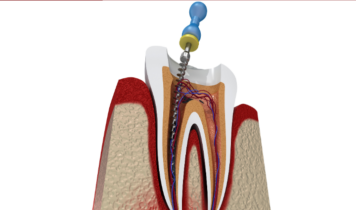Root Canal Treatment
Root canal treatment is a dental procedure performed to treat an infected or damaged tooth pulp. The pulp is the soft tissue inside the tooth that contains nerves and blood vessels. When the pulp becomes infected due to decay, injury, or other factors, it can cause severe pain, and swelling which may lead to the development of an abscess. Root canal treatment can help save a tooth from extraction and restore its function and appearance. It is typically performed under local anesthesia and may require single or multiple visits to complete depending on the severity of the condition.

Root canal treatment may be recommended for the following dental problems or conditions:
- Deep tooth decay: When the decay reaches the innermost layer of the tooth, the pulp can become infected or inflamed.
- Trauma or injury to the tooth: A strong blow or impact to the mouth can damage the tooth and its pulp.
- Cracked or chipped tooth: If the crack or chip is deep enough to reach the pulp, it can cause sensitivity and pain.
- Repeated dental procedures: Repeated dental procedures on the same tooth can damage the pulp, making it necessary to perform a root canal treatment.
- Gum disease: Advanced gum disease can cause the gum tissue to pull away from the teeth, exposing the root and making it vulnerable to infection.
- Large filling: A large filling can weaken the tooth and make it more susceptible to decay and damage to the pulp.
- Abscess: An abscess is a pus-filled pocket that can form at the tip of the tooth's root due to an infection.
If you are experiencing pain, sensitivity, or any other symptoms related to the above conditions, it is essential to see the dentist for an evaluation to determine if root canal treatment is necessary.
If there's anything you'd like to know more about, just let us know - we're always happy to provide additional information
Fill the details will get back to you shortly...

A root canal treatment is needed to save a tooth that is severely damaged or infected. It is a necessary procedure to prevent the spread of infection, alleviate pain, and preserve the tooth.
The root canal treatment itself is not painful because it is performed under local anesthesia, which numbs the area being treated. After the procedure, some discomfort or sensitivity may be experienced for a few days, but this can be managed with over-the-counter pain medications.
The duration of a root canal treatment varies depending on the tooth's complexity and the severity of the infection. Generally, the procedure can be completed in one or two appointments, each lasting from 60 to 90 minutes.
Yes, a crown is mandatory after a root canal treatment to protect and strengthen the tooth. A crown can help prevent the tooth from breaking and restore its function and appearance.
A tooth with a root canal treatment can last a lifetime with proper oral hygiene and regular dental check-ups. However, it's important to note that the success of the treatment also depends on factors such as the severity of the infection, the tooth's location, and the quality of the restoration.
After a root canal treatment, it's important to follow certain post-treatment care instructions to promote healing, reduce discomfort, and maintain the success of the treatment. Here are some common recommendations:
- Take pain medications as prescribed to manage any discomfort or sensitivity.
- Avoid chewing or biting with the treated tooth until the final restoration is placed.
- Maintain good oral hygiene by brushing and flossing regularly and using an antiseptic mouthwash to help reduce bacteria in the mouth.
- Avoid hard, crunchy, or sticky foods that may damage the temporary filling or restoration.
- Attend all scheduled follow-up appointments to monitor the healing process and ensure proper function and fit of the final restoration.
- If a permanent restoration is not placed within a few weeks of the root canal treatment, avoid eating hard or sticky foods with the treated tooth and be careful when chewing.
- Notify if you experience persistent pain, swelling, or any other unusual symptoms after the treatment.
By following these post-treatment care instructions, you can help ensure the success of your root canal treatment and maintain good oral health.

Working Hours
Monday - Saturday : 10:30 AM - 7:00 PM
Thursday: Holiday
Sunday: 10:30 AM - 1:00 PM
Call Us
+91 91081 24151
+91 99001 14151
Mail Us
happytohelp@vatsandparam.com